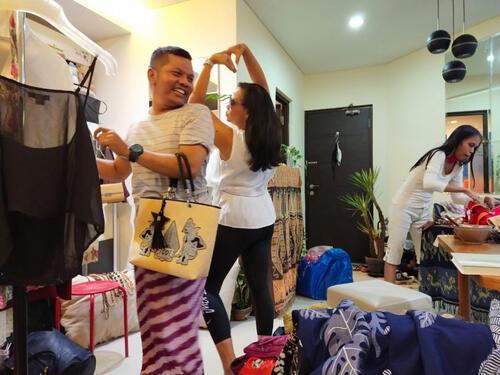“Preloveds”, Prejudice, and Heroism: Gender Minorities in Indonesia

"Preloveds", Prejudice, and Heroism: Gender Minorities in Indonesia
Ati Nurbaiti begins her Jakarta Post article “Accepting transgender, diverse identities on Peace Day” with a description of the online resale shop Sriloved. Created by “gay activist” Hartoyo, the shop presents its low-priced used goods live on Facebook to potential buyers. Sales then go to support Indonesia’s transgender waria community as well as LGBT advocacy work. According to the article, COVID-19 has been especially difficult for the waria community because restrictions interfere with primary sources of income: “the beauty salons and streets for busking or konser — concerts in waria- speak.” It is a pattern repeated across the globe that marginal groups are often the most vulnerable to public crises. Yet the sale of these “preloved” items has social benefits in addition to their economic impact.
According to Hartoyo, the “preloveds” also work as a “a red carpet, a bridge to breaking the rigidity.” More specifically, a cultural rigidity which greatly intensifies during election seasons and sees the LGBT population placed next to the communists as enemies of society. It is interesting that elections, those quintessential expressions of the democratic process, can also be the periods which most excite iliberal tendencies. And despite what Nurbaiti describes as a general post-election return to “social and cultural acceptance of minorities” in Indonesia, groups like the waria still face prejudice on a regular basis. When government officials do not accept the waria identity on a personal level, their decision is transla ted into an institutional attitude that can withhold ID cards and prevent access to public services ranging from healthcare to burial plots.
ted into an institutional attitude that can withhold ID cards and prevent access to public services ranging from healthcare to burial plots.
The relation between organized religion and the LBGT community is complex, and Nurbaiti spends a good deal of time on the subject, discussing the stories and struggles of waria in Indonesia who attend the only Islamic boarding school for transgender students. In fact, Nurbaiti writes that these waria students inspired her to realize something new about her own family. Yet, it may be off-putting to some western readers that this revelation does not concern her transgender cousin, but rather the heroic nature of her Aunt and other parents for coming to accept a transgender child. To an audience for whom transgender rights are viewed as normalized, such praise seems unwarranted or even misplaced. However, in an environment where such views are less pervasive, what qualifies as praiseworthy—surpassing the norm—differs according to the prevailing social climate. As Nurbaiti puts it, “We’re mostly surrounded by family and friends condemning or pitying LGBT, suggesting ways to return them to the straight and narrow.”
This reality also speaks to how Nurbaiti chooses to end the piece: simply, tentatively, calling on readers, “as really kind people,” to “help others in need, regardless of sexual orientation” and consider donating or purchasing the preloved products described in the introduction. The effectiveness of this call to action is reinforced by the nature of the purchase itself. Selling goods online to support their causes enables activists like Hartoyo to establish a sort of intermediary between their identities and potential buyers: one through which neutral transactions can be made that benefit both parties independently. That the goods being sold are “preloved”, originating from preexisting and external social contexts, completes the buffer. In this way, customers can support gender minority communities without needing to be as praiseworthy as those parents who have learned to accept their LBGT children.
Comments
Jarron,
When I read this sentence of yours, I almost fell out of my chair because it is so true, and hits close to home right now: “It is interesting that elections, those quintessential expressions of the democratic process, can also be the periods which most excite iliberal tendencies.”
You have a knack for finding such significance in the must subtle of details, and your analysis of this story is really quite powerful. I find the search for small acts of kindness in the face of major struggles to be strangely appealing. The question, I suppose, is whether such small acts can add up to a larger movement for social justice?
Pages